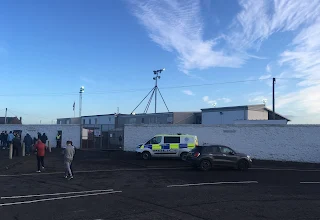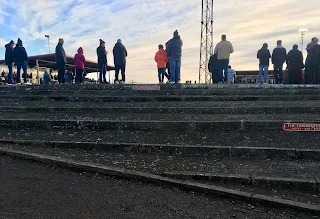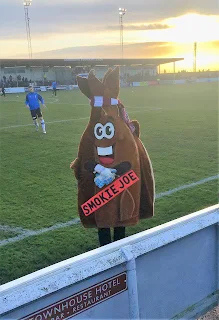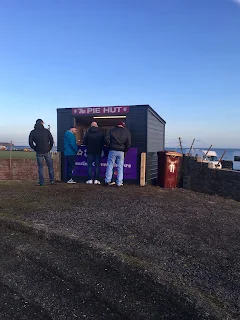Arbroath
FC is a football club from the Scottish town of the same name, located on the
north east Angus coast and formed on July 1st 1878, following a meeting in the
George Hotel on Commerce Street.
The
club acquired the site of a former rubbish dump to develop the original Gayfield
Park, later known as Lesser Gayfield, as their home in 1880 before choosing
maroon shirts as regular club colours a couple of years later.
They set a record
when they defeated the Aberdeen side Bon Accord 36-0 at Gayfield with eighteen-year-old Jocky Petrie helping himself to thirteen goals. Referee
Dave Stormont also chalked off seven goals!
The Arbroath side was: Jim Milne Sr,
Bill Collie, Tom Salmond, Hen Rennie, Jim Milne Jr, Dyken Bruce, Johnny Tackett,
Jim Marshall, David Crawford, Daniel Neil and Petrie. The hapless Bon Accord
goalie was Andrew Lornie.
In
1887, goalkeeper Ned Doig became the only Arbroath player to win a full Scotland
cap before he became one of several other players to head south to join English
and larger Scottish clubs in 1890. Arbroath
became a member of the Northern League in 1891, being crowned champions in 1892-93.
‘The Red Lichties’ gained admission to the Scottish Alliance for the
1920-21 season and then Division Two of the Scottish League in 1921-22. The first game at the new Gayfield Park took place against East Fife at the start of the 1925-26 campaign. A runners-up finish in 1934-35 secured promotion to Division One under long-serving manager Bob McGlashan.
The
same season saw the sale of George Mutch for £800 to Manchester United. The
striker would go on to score the winner in an FA Cup final for Preston North
End. The era saw the team finish consistently in mid-table of the top flight.
However, the club was placed in Division Two following World War Two.
A fine run in 1946-47 took Arbroath all the way to the Scottish Cup semi-finals, where they succumbed 2-0 to Aberdeen at Dens Park under new boss Archie Anderson, before the former Aberdeen, Chelsea and Scotland player Alec Cheyne took over in 1949.
Former
club captain Chris Anderson became team manager in 1957 before the goals of Dave
Easson fired the side to promotion in 1958-59. However, their spell in the top
tier lasted just twelve months, despite reaching the semi-finals of the League
Cup, going down 3-0 to Third Lanark.
John Prentice was appointed as Arbroath manager in 1960, as Easson was sold before returning a couple of years later after Albert Henderson became manager. Future record appearance holder Tom Cargill made his debut in 1966. Jimmy Jack and Dennis Bruce fired in the goals as the Lichties won promotion in 1967-68.
Once again, the jump in quality proved too much, with Arbroath going straight
back down. A
further promotion was clinched in 1971-72, with the team remaining in the First
Division until the end of the 1974-75 season. The new Premier League was
introduced, with Arbroath being placed in the revamped First Division.
After seventeen years at the helm, manager Henderson was sacked and replaced by Ian Stewart in 1980 as the team went down to Division Two, with George Fleming coming in as team supremo two years later. Arbroath finished bottom of the entire Scottish League in 1984-85. Jimmy Bone arrived as the new manager before moving on to St Mirren a couple of years later and being replaced by John Young.
Young was sacked after another bottom
finish, to be succeeded for a short spell by Walter Borthwick and then Ian
Gibson. Mike
Lawson didn’t last much longer before former Celtic and Scotland legend Danny
McGrain arrived at Gayfield. Striker Paul Tosh was sold to Dundee for £120,000
before Arbroath reached the last eight of the Scottish Cup in 1992-93 before
losing to Rangers.
Jocky
Scott became manager in 1994 when McGrain fell ill, before leaving within a few
months, with George Mackie taking over. Further reconstruction of the Scottish
League was installed for the 1995-96 campaign, with Arbroath joining the fourth
level, in the Third Division.
The
season would see John Brogan take over as manager from Mackie. A poor set of
results saw Tommy Campbell installed as boss within a year before he moved on
to be replaced by Dave Baikie in 1996-97.
The
former Tayport manager led Arbroath to promotion to the Second Division in
1997-98 before resigning in 2000, with John Brownlie his replacement. A
runners-up spot in 2000-01 saw the Lichties reach the First Division.
After
two seasons, Arbroath went back down to the Second Division with Brownlie being
replaced by Stevie Kirk. Harry Cairney had taken over by the time that another
relegation was avoided, before the club went back down to the Third Division in
2004-05.
John
McGlashan was at the helm in 2005-06 as the team reached the playoffs, going out
in the semi-finals to Alloa Athletic. The following season, Queen’s Park ended its dreams of promotion at the same stage of the play-offs.
However, Arbroath were not to be denied in the 2007-08 play-offs. Cowdenbeath and then Stranraer were defeated as the Lichties returned to the third tier. By 2009-10, Jim Weir was in charge of the team. Relegation back to the Third Division occurred following a defeat to Forfar Athletic in the play-offs.
Paul Sheerin was appointed as player-manager at the end of the season. Gavin Swankie and Josh Falkingham starred as Arbroath were crowned as Third Division champions in 2010-11. A runners-up finish the following season saw a play-off place, where the Lichties' hopes of promotion were dashed by Dunfermline Athletic.
Arbroath went on to
take Celtic to a replay in the fourth round of the Scottish Cup in 2012-13.
Allan
Moore took over from Sheerin, who took a coaching role at Aberdeen, for the
2014-15 season, before Todd Lumsden was put in charge in 2015-16. He was
replaced by Dick Campbell.
The 2016-17 campaign saw Arbroath lift the title of the retitled fourth tier to become champions of Scottish League Two. In 2017-18, Arbroath reached the playoffs before losing out to Dumbarton.
The
goals of Bobby Linn helped the Gayfield side to the League One title in 2018-19
as they returned to the second tier Championship, finishing fifth in 2019-20 when the season ended early owing to the COVID-19 pandemic.
Arbroath continued to consolidate their status in the second tier of Scottish football, reaching the playoffs for promotion in 2021-22, where they lost their semi-final tie to Inverness Caledonian Thistle. Jim McIntyre replaced the long-serving Campbell in December 2023.
The team was well-adrift of the rest at the end of the 2023-24 season. The duo of David Gold and Colin Hamilton became joint-managers in August 2024, taking their side to the title and promotion back to the Championship, with Gavin Reilly playing a star role.
Arbroath
FC will play in the Scottish Championship in the 2025-26 season.
My visit
My visit
Arbroath’s Gayfield ground, located right by the North Sea, was a venue that I saw in pictures as a
youngster and always wanted to go to. Several pals had been in the past and
said it was a good day out. It was time to find out for myself on a Scottish
Cup weekend trip.
I’d been to
the borefest of Rangers v Stranraer the previous evening and also had a Tayside
double header lined up. Dundee against Motherwell after Arbroath, and then
Dundee United versus Hibernian on Sunday afternoon.
I’d awoken
after thawing out, having had a thoroughly enjoyable few hours drinking in Glasgow following the Rangers tie.
I grabbed a roll and coffee at Gregg’s before boarding the 9.08 service to
Dundee from Queen’s Street for an enjoyable journey across country.
Arriving on
time, I had a quick peek inside the V&A museum on the waterfront before
walking into town and spending a few quid in Primark on new thick socks and a
pair of mittens, having been caught out with the cold the previous evening.
Some Falkirk
fans were on the train as we travelled on the coast towards our destination. It
was a cold but bright day, with Carnoustie Golf Links looking an absolute picture.
In less than half an hour, we arrived in Arbroath.
Before exploring
the town centre, I walked the other way and visited the Ogilvy Park home of Junior/non-league
side Arbroath Victoria, which can be read about here. Returning to the bus
station, I then walked down the vibrant streets past Arbroath Abbey towards the
harbour.
I could
imagine a bustling town in the summer season with plenty of restaurants and
fish and chip shops remaining closed on this winter’s day. It was certainly
picturesque. I weaved my way round to sit outside The Bellrock to enjoy curry
sauce and chips while reflecting on the several links to my visit.
I’d drunk in
The Bon Accord in Glasgow. Bon Accord from Aberdeen lost 36-0 in the Scottish
Cup to Arbroath in 1885. The town was celebrating the 700th anniversary of the
Declaration of Arbroath, purported to be one of the most important documents in
Scottish history, drafted in 1320 by Bernard, Abbot of Arbroath.
There was a
further connection. In the Bon Accord, I was drinking Brockville Pale from the
Tryst Brewery, named in tribute to Falkirk’s former ground. I thought it was
interesting stuff anyway!
I’d been
recommended the Tutties Neuk for my pre-match refreshment by Prorege, a font of
all Scottish football knowledge on the Non-League Matters forum. I took a
liking to Tennants rather than my usual ale, with only Belhaven Best available
on keg.
The pub got
very busy, including trade from some rather inebriated visiting Bairns. One of
the more sensible ones was impressed with my travels to the game and offered me
the instruction to cheer for Falkirk and to "Love life and f**k
Fife". It was a new one on me!
Over the
road, I paid £15 entry and then headed straight to the tea hut on the
recommendation of my tipster. He was bang on about the culinary delights of the
steak and black pudding pie, though the Bovril was weak, having been made from a
cube that refused to dissolve rather than granules.
A fellow
Twitter pal, Gordon Anderson, had noticed my attendance and met up as we
reminisced about cricket in Bangkok, as well as local cricket and happy days in the hot Thai sun. That
was certainly a stark contrast to the conditions on the Angus coast.
Gayfield had
lots of terracing and cover on all four sides. The enclosure on the sea wall
side offered a bit of shelter from the wind, though the camera gantry cut down
on a clear view of all the pitch. The mittens had definitely been a useful purchase.
I struggled to keep my composure when I looked up and saw the club mascot. I did like the clever play on words of "Smokey Joe" and accepted that Arbroath smokies are part of the town's proud heritage, but it just didn't look right. It certainly gave me and my Facebook friends a giggle. Fair play to Joe for giving me a wave!
I struggled to keep my composure when I looked up and saw the club mascot. I did like the clever play on words of "Smokey Joe" and accepted that Arbroath smokies are part of the town's proud heritage, but it just didn't look right. It certainly gave me and my Facebook friends a giggle. Fair play to Joe for giving me a wave!
Falkirk were
cheered on by a decent following on a rare occasion that saw the Red Lichties in
a higher division. Incidentally. Gordon told me the host's nickname came from
the red lanterns that guided the old fishing boats into the harbour when they were the town's
primary form of employment.
Thomas
O’Brien saw an early shot easily dealt with by former Arbroath keeper Robbie
Mutch in the Falkirk net. Declan McManus responded by heading wide for the
visitors. Mark Whatley nearly got in on goal before having a shot blocked for the
hosts.
Arbroath
continued to press with Michael McKenna firing narrowly over and fans favourite
Bobby Linn looking menacing. Morgaro Gomis saw a couple of efforts go over the
bar for Falkirk, but a goal looked unlikely in coming at the break.
After the
interval, it was Falkirk who looked the more likely to score. Derek Gaston made
a good close-range save to keep out McManus just before the hour mark. In the
closing stages, sub David McMillan could and should have probably won it for the
Bairns, but he headed over when well placed.
It hadn’t
been a thriller for sure, but I was glad I’d made the effort. Gayfield lived up
to all I’d hoped, and it was good to catch up with Gordon and have a yarn. The
bracing sea air had certainly blown away any remaining cobwebs!
The train took
me back to Dundee not long after full time before I took a cab up the hill to
the Travelodge on Strathmore Avenue for a warm-up and walk down to the ground
for my evening’s encounter.
























No comments:
Post a Comment